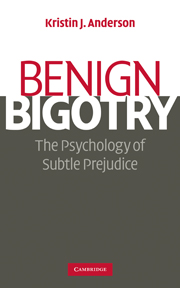Book contents
- Frontmatter
- Contents
- Acknowledgments
- Introduction: The changing place of prejudice: a migration underground
- 1 “Those people all look alike”: The myth of the other
- 2 “They must be guilty of something”: Myths of criminalization
- 3 “Feminists are man-haters”: Backlash myth-making
- 4 “Gays flaunt their sexuality”: The myth of hypersexuality
- 5 “I'm not a racist, I'm colorblind”: The myth of neutrality
- 6 “Affirmative action is reverse racism”: The myth of merit
- Conclusion
- Index
3 - “Feminists are man-haters”: Backlash myth-making
Published online by Cambridge University Press: 05 June 2012
- Frontmatter
- Contents
- Acknowledgments
- Introduction: The changing place of prejudice: a migration underground
- 1 “Those people all look alike”: The myth of the other
- 2 “They must be guilty of something”: Myths of criminalization
- 3 “Feminists are man-haters”: Backlash myth-making
- 4 “Gays flaunt their sexuality”: The myth of hypersexuality
- 5 “I'm not a racist, I'm colorblind”: The myth of neutrality
- 6 “Affirmative action is reverse racism”: The myth of merit
- Conclusion
- Index
Summary
The feminist agenda is not about equal rights for women. It is about a socialist, anti-family political movement that encourages women to leave their husbands, kill their children, practice witchcraft, destroy capitalism, and become lesbians.
Reverend Pat RobertsonFeminism. The very word evokes strong feelings in most people. Strong feelings and, too often, a world of misconceptions. The real meaning of feminism and what it actually means to call oneself a feminist has become mired in and obscured by an array of prejudices, preconceptions, and mechanisms that serve to maintain the existing distribution of power and inequality. Structured inequality based on gender – much like inequalities based on race, ethnicity or sexual identity – has been an established way of doing things for centuries. For some, the question begins and ends with women's right to vote. For others, a belief exists that gender inequality is, in large part, a thing of the past, and that women now enjoy social and economic equality in terms of access to resources and prestige. Still others believe that feminism is a somewhat antique effort, a passing fad the necessity of which has been satisfied by progress. In any event, many women and many more men resist identifying themselves as feminists. A number of factors are at work here, but, in the final analysis, it amounts to this: feminists are thought to be man-haters.
As we try to separate fact from fiction and reason from prejudice, let's first examine what is really at stake when we talk about feminism.
- Type
- Chapter
- Information
- Benign BigotryThe Psychology of Subtle Prejudice, pp. 129 - 192Publisher: Cambridge University PressPrint publication year: 2009



